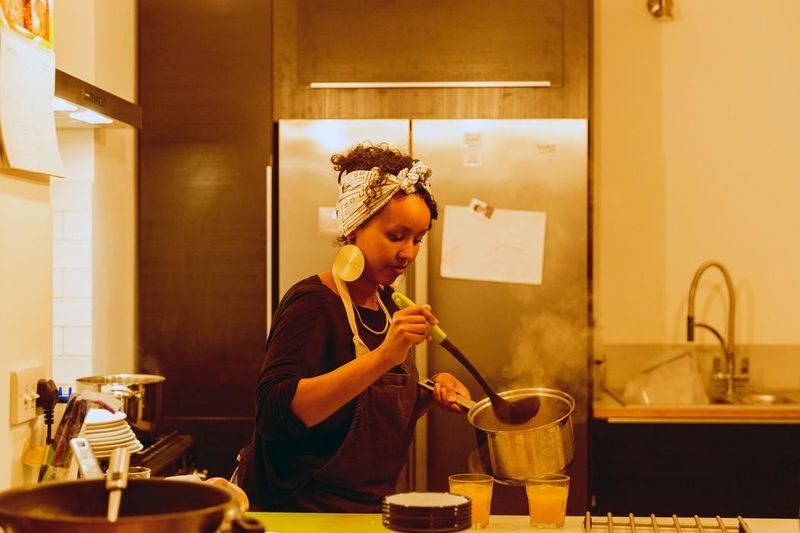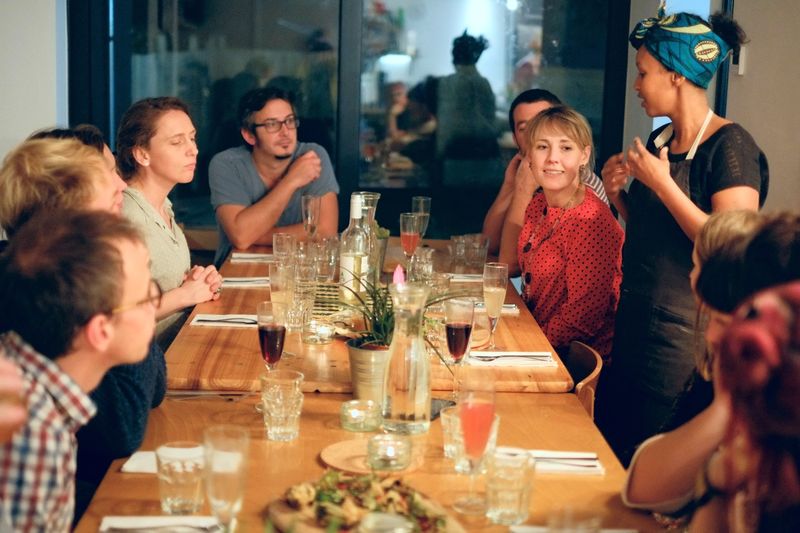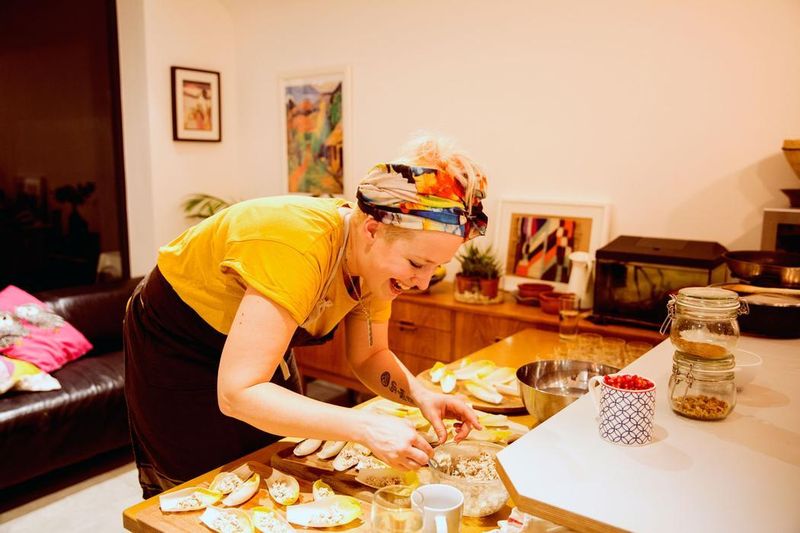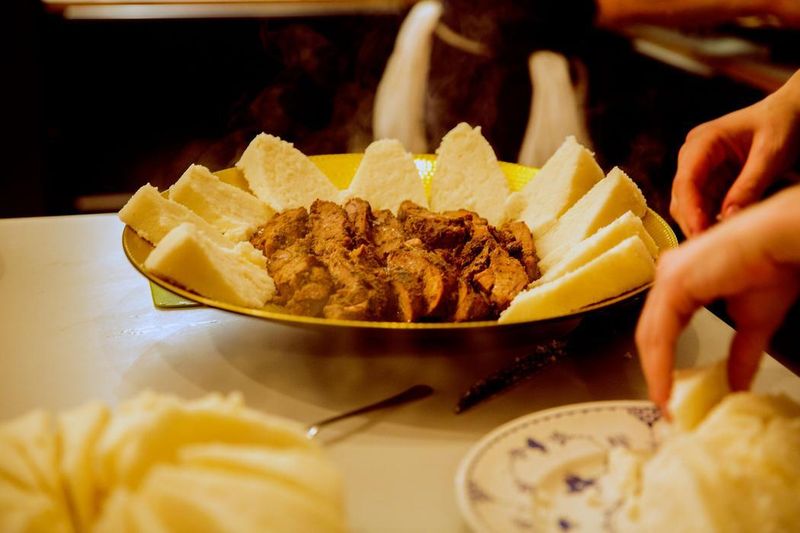The Somali and Swahili Supper Club That’s Headed to London

Fozia Ismail and Edwina Bruford first met in a play park sandpit in the city of Bristol. They were both adults, looking after their respective toddlers of similar age. (“It’s all glamour here!” Ismail recently told me of this initial meeting.) The women got on well, bonding over shared experiences of eating their parents’ East African cooking. Ismail, who is black, was raised on a steady diet of her mother’s Somali food, while Bruford, whose father is a white Kenyan, grew up on what she calls Swahili food..
Both noticed a space in the market in Bristol for foods from either region. Late last year, they decided they would be the ones to fill it: The pair launched the Matatu Kitchen, a roving supper club in Bristol, held on a monthly basis. The Matatu Kitchen borrows its name from the minibuses that traverse the streets of Nairobi, with psychedelic decorations, lively music, and chaotic driving. It was the pair’s desire to convey spirit and excitement in their kitchen, sans chaos

The nights are filled with menus that change with each iteration: The latest had Swahili lobster, doused in coconut sauce; mandazi, cardamom-spiced donuts; and Zanzibari coffee, infused with cardamom and ginger. They have thus far been alarmed by the project’s successes, tickets often selling out within days, giving the pair the confidence to bring it to London later this year.

Bruford prepping food at a recent event. Photo by Emli Bendixen
The women have found that so many onlookers in the West think of hunger and swollen stomachs when asked about East African food, and they wanted to convey their own experiences of abundance and generosity. In her experience, Ismail has found that most Brits blithely treat Somali food as an afterthought, that its food takes a backseat to the problems of war, famine, and piracy that have saturated news reports about it the region. Bruford, meanwhile, feels that Kenyan cuisine has often been misconstrued as a collage of bland carbs and tough, gristly meat. It was far from what they knew.
Ismail grew up in Stonebridge, an enclave of North West London with a predominantly Afro-Caribbean and African population. She came there from Kuwait, where she was born to a Somali refugee mother, in the 1980s. “Cooking was her voice,” Ismail insisted of her mother. “It was a way to communicate her love, her Somali-Muslim identity, to us in an environment that was unfamiliar.” Her mother came from a pastoralist family, so she lived as a nomad, herding goats along the Somaliland-Ethiopia border. This endowed Ismail’s mother with an appreciation of where food came from and the privileges of being in a place like London, where food was no longer scarce.
“Even people who live very financially modest lives put great care and attention into their food,” Ismail argued. “Incredible fruits and vegetables are grown and cooked in a myriad of wonderful ways.” Ismail’s mother cooked a range of dishes, from bariis, a fragrant Somali pilau rice, with mutton and banana; various stews, some broth-like in consistency and fragrant, others more thick and unctuous like South Asian mutton curries; laaxoox, a sourdough Somali pancake made with sorghum flour.

Bruford’s Kenyan-born father raised her in Devon with a fierce, careful understanding of the colonial imprints British occupation had left on the country’s foodways. He was outspoken about the colonial injustices sewn into Kenya’s history, and he wanted to instill within his daughter a sense of its wrongs. So he told her the story of maize, found in such beloved dishes as ugali (“Never diss maize to a Kenyan!” she joked), which the British grew to feed their slaves and later employees. It was fast growing, cheap, and made one feel full in spite of its relatively low nutritional value compared to the traditional staples of millet, sorghum, yam, and cassava. This affection, Bruford would come to learn, was informed by exploitation.
Food did not gain sudden political meaning for the pair; it was always political, an outlook their parents had raised them on. The biggest challenge in mounting the supper club has been beyond logistics. Ismail and Bruford have wrestled with how to control the narrative around the food they hold so dear, wanting to make sure that their foods are not fetishized as trends by their audience. “I am struggling with how we do things that are true to my values and honor people like my mum and other East Africans without it being some kind of fad,” Ismail confessed. “It’s an opportunity to not just feed people delicious food but maybe make them think about their everyday interactions with people who might not look like them.”

In addition to their hope of bringing Matatu Kitchen to London later this year, the pair wants, eventually, to organize an African food symposium in the city featuring African chefs from all over the world. (Their dream is to have Marcus Samuelsson host the event, crediting him with increasing interest in the foods found across the continent.) They’d also like to release a cookbook, in due time.
For now, though, the pair is working with artist Rosalie Schweiker on a workshop meant to interrogate the idea of Britishness via everyday foods and beverages, like tea—a drink so synonymous with British identity, yet with roots firmly planted in the country’s colonial past. It’ll be modeled, somewhat, after another workshop they held with her in January in London, “A Solution Lies in Salt and Spice.” (The title is borrowed from an Ethiopian proverb.) In it, they encouraged participants to create Somali sambusa, phyllo dough stuffed with vegetables and meat, encouraging connection through the act of making food.
